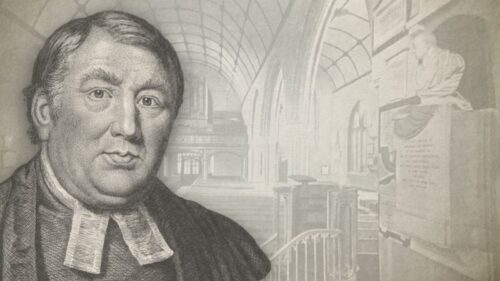
October 26—Morning Devotion
“He went on frowardly in the way of his heart; I have seen his ways, and-will heal him.”—Isaiah 57:17,18
Pause, my soul, over this sweet scripture; and while thou readest it, wilt thou not cry out with David, in the contemplation of the overwhelming mercy: “And is this the manner of man, Oh Lord God!” 2 Sam. 7:19. Think, Oh my soul, how it was with thee, when in the days of thy unregeneracy thou wentest on frowardly in the way of thy perverse heart. Who could have stopped thee, had not sovereign grace? And how justly might the Lord have said, I have seen thy ways, and will punish thee; I will give thee over to a reprobate mind, and forsake thee for ever!—Oh the riches of grace, when, from my very unworthiness, the Lord took occasion to magnify his love and mercy. Oh Lord Jesus, do thou incline the heart that thou hast healed to live to thy praise, and let the life thou hast saved from destruction, be spent in thy service.
Robert Hawker (1753-1827) was an Anglican (High-Calvinist) preacher who served as Vicar of Charles Church, Plymouth. John Hazelton wrote of him:
“The prominent features…in Robert Hawker's testimony…was the Person of Christ….Dr. Hawker delighted to speak of his Lord as "My most glorious Christ.” What anxious heart but finds at times in the perusal of the doctor's writings a measure of relief, a softening, and a mellowing? an almost imperceptible yet secret and constraining power in leading out of self and off from the misery and bondage of the flesh into a contemplation of the Person and preciousness of Christ as "the chiefest among ten thousand and the altogether lovely." Christ and Him crucified was emphatically the burden of his song and the keynote of his ministry. He preached his last sermon in Charles Church on March 18th, 1827, and on April 6th he died, after being six years curate and forty-three years vicar of the parish. On the last day of his life he repeated a part of Ephesians 1, from the 6th to the 12th verses, and as he proceeded he enlarged on the verses, but dwelt more fully on these words: "To the praise of His glory Who first trusted in Christ." He paused and asked, "Who first trusted in Christ?" And then made this answer: "It was God the Father Who first trusted in Christ."
Robert Hawker on the Biblical Covenants (Complete)
Robert Hawker's Poor Man's Morning Portions





